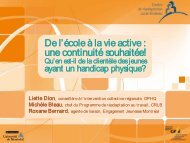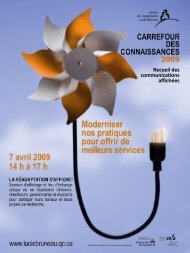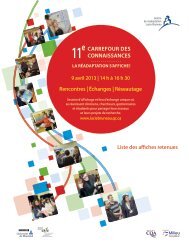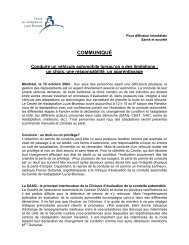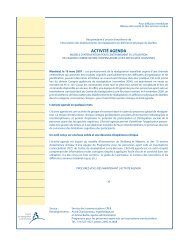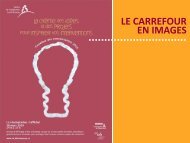recueil des communications affichées - Centre de réadaptation ...
recueil des communications affichées - Centre de réadaptation ...
recueil des communications affichées - Centre de réadaptation ...
You also want an ePaper? Increase the reach of your titles
YUMPU automatically turns print PDFs into web optimized ePapers that Google loves.
SEXUALITY AFTER TRAUMATIC BRAIN INJURY<br />
Alexan<strong>de</strong>r Moreno 1 , Michelle McKerral 1,2,3<br />
1.<strong>Centre</strong> <strong>de</strong> recherche en neuropsychologie et cognition, Université <strong>de</strong> Montréal; 2.<strong>Centre</strong> <strong>de</strong> recherche interdisciplinaire<br />
en réadaptation du Montréal métropolitain; 3.<strong>Centre</strong> <strong>de</strong> réadaptation Lucie‐Bruneau<br />
Introduction<br />
Traumatic brain injury (TBI) can directly and indirectly affect important aspects related to sexuality and sexual<br />
function due to the various cognitive, psychiatric/behavioral, and physical/functional sequelae presented by<br />
survivors. In fact, it has been suggested that 50 to 60 % of persons with TBI report some level of disruption in<br />
their post‐injury sexual functioning.<br />
Objective<br />
The objective of this study was to critically review the empirical evi<strong>de</strong>nce concerning TBI and sexuality.<br />
Methods<br />
A literature review was performed in databases related to psychology and health sciences such as PsychINFO,<br />
Proquest, PsychArticles, andMedline. The keywords that were used in the search were traumatic brain injury<br />
and sexuality, and their variants.<br />
Results<br />
Studies were classified according to the participants enrolled and findings are presented from the<br />
professional’s (7 %), the patient’s (64 %), the non‐injured spouse’s (7 %), and the patient‐partner’s<br />
perspectives (22 %).<br />
Conclusions<br />
Most of the evi<strong>de</strong>nce based literature concerning TBI and sexuality has been <strong><strong>de</strong>s</strong>cribed from the patient’s<br />
perspective. The partner's perspective was addressed primarily to have an in<strong>de</strong>x of the effect of sexual<br />
dysfunction on the relationship and only in one study it was used to establish if the patient’s self‐report was<br />
an accurate measure of his or her actual sexual functioning. Loss of insight or anosognosia may limit the<br />
patient’s self‐perception of <strong>de</strong>ficits and may be an obstacle when trying to get reliable information concerning<br />
sexuality issues. A comprehensive approach is required to address sexual functioning of TBI survivors since<br />
they have special medical, legal, behavioral, and education needs.<br />
3


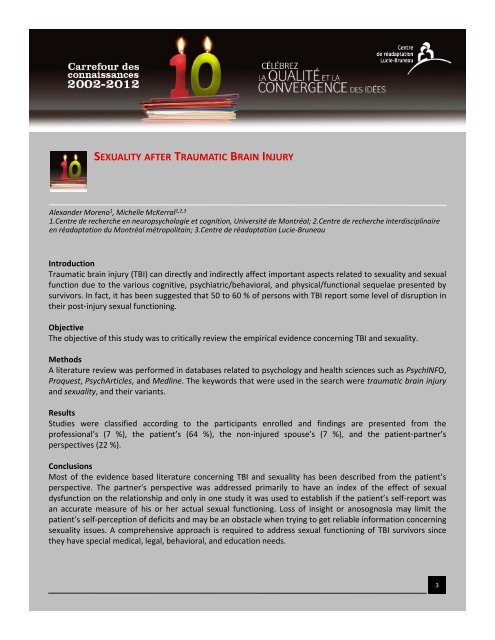

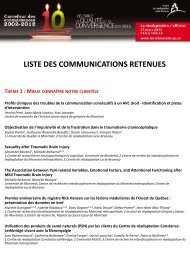
![Télécharger le questionnaire de l'IMD [PDF - 17 Ko]](https://img.yumpu.com/50142992/1/190x245/taclaccharger-le-questionnaire-de-limd-pdf-17-ko.jpg?quality=85)
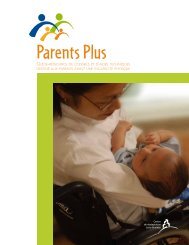
![Recueil des communications affichées - CC 2011[PDF - 1486Ko]](https://img.yumpu.com/48700479/1/190x253/recueil-des-communications-affichaces-cc-2011pdf-1486ko.jpg?quality=85)
